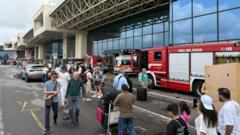In a daunting operation reminiscent of wartime measures, the German city of Cologne is evacuating approximately 20,500 residents from the city center to facilitate the safe defusal of three unexploded World War II bombs. Found in a shipyard in the Deutz neighborhood, these historic remnants of conflict include bombs weighing ten and twenty tonnes, posing significant hazards if not dealt with appropriately. The operation is being described as the largest since the end of WWII, as a 1,000-meter (over 3,280 feet) area has been secured to ensure public safety.
Cologne Launches Major Evacuation for WWII Bomb Diffusion Operation

Cologne Launches Major Evacuation for WWII Bomb Diffusion Operation
Cologne is taking extensive measures to safely defuse three WWII bombs, affecting over 20,000 residents as authorities prioritize safety.
The evacuation process commenced on Monday, with officials visiting homes to deliver evacuation notices. Residents were warned that refusal to vacate could result in police intervention and potential fines. This broad evacuation involves numerous civic institutions: schools, hospitals, shops, hotels, and cultural venues, creating significant disruptions in the area. For example, transport routes, including the Messe/Deutz train station, were closed, severely affecting mobility for commuters.
During this period, local health services are actively supporting the relocation of patients, including those in intensive care at Eduardus Hospital, to ensure their safety and continued care. The city authorities have established temporary centers for those needing shelter during the evacuation. While Cologne Bonn Airport continues to operate flights, access remains a challenge due to transportation halts associated with the bomb disposal operation.
As residents navigate this unsettling experience, officials are urging calm and providing guidance on personal belongings and medication. This incident underscores the enduring legacies of WWII, highlighting the long-term impact of historical events on contemporary societies in Germany and beyond.
During this period, local health services are actively supporting the relocation of patients, including those in intensive care at Eduardus Hospital, to ensure their safety and continued care. The city authorities have established temporary centers for those needing shelter during the evacuation. While Cologne Bonn Airport continues to operate flights, access remains a challenge due to transportation halts associated with the bomb disposal operation.
As residents navigate this unsettling experience, officials are urging calm and providing guidance on personal belongings and medication. This incident underscores the enduring legacies of WWII, highlighting the long-term impact of historical events on contemporary societies in Germany and beyond.





















